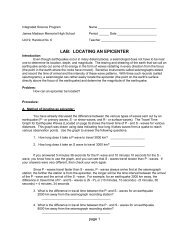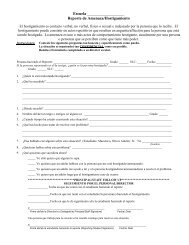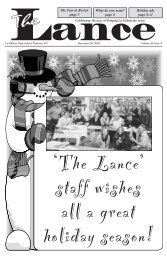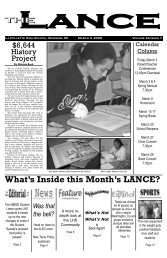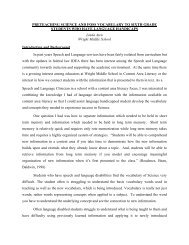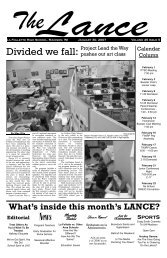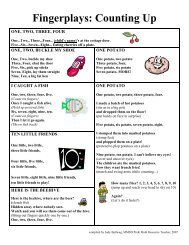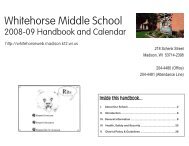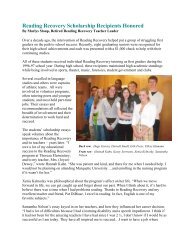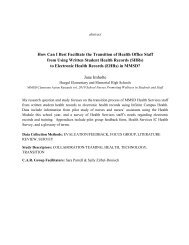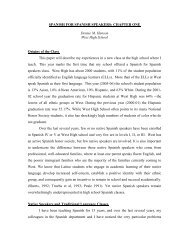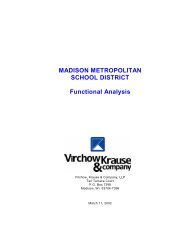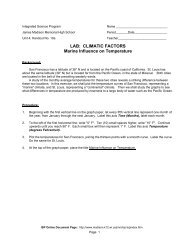Gompers Elementary School • 1502 Wyoming Way, Madison, WI ...
Gompers Elementary School • 1502 Wyoming Way, Madison, WI ...
Gompers Elementary School • 1502 Wyoming Way, Madison, WI ...
You also want an ePaper? Increase the reach of your titles
YUMPU automatically turns print PDFs into web optimized ePapers that Google loves.
Health, Safety & Security (cont.)<br />
Wellness Policy On Physical Activity And Nutrition<br />
(Refer to www.mmsd.org for complete Boe Policy 4610)<br />
Children and adolescents need access to healthful foods and opportunities to be physically active in order to grow, learn, and thrive. Good health fosters student<br />
attendance and education.<br />
The <strong>Madison</strong> Metropolitan <strong>School</strong> District (MMSD) is committed to providing school environments that promote and protect the health and well-being of all<br />
students by supporting healthy eating and physical activity which are important for their ability to learn. It is the policy of the <strong>Madison</strong> Metropolitan <strong>School</strong> District<br />
Board of Education that<br />
<strong>•</strong> <strong>School</strong>s shall provide nutrition education and physical education to foster lifelong habits of healthy eating and physical activity, and shall establish<br />
linkages between health education and school meal programs, and other activities that occur within the school day.<br />
<strong>•</strong> All students in grades K-12 shall have opportunities and encouragement to be physically active on a regular basis.<br />
<strong>•</strong> Foods and beverages sold or served at school during the school day, at school sponsored events and in MSCR programs for students shall meet the<br />
nutrition recommendations of the U.S. Dietary Guidelines for Americans, 2005.<br />
<strong>•</strong> To the maximum extent practicable, all schools in the MMSD shall participate in available federal school meal programs.<br />
Wellness Policy<br />
The "Wellness Policy on Physical Activity and Nutrition" has been approved by the BOE. (For detailed information see BOE Policy 4610.)<br />
The purpose of the policy is to ensure that all students have "access to healthful foods and opportunities to be physically active in order to grow, learn and<br />
thrive." The intent of this document is to provide highlights within each of the five areas covered by the policy.<br />
I. <strong>School</strong> Nutrition Education Goals<br />
<strong>Elementary</strong> <strong>School</strong>s Nutrition competencies will be integrated into existing curriculum/programs. Grades 1 and 3 are targeted for implementation.<br />
Teaching and Learning will develop and pilot nutrition activities/curriculum during the 2006-07 school year with full<br />
implementation expected in 2007-2008.<br />
II. Physical Activity Goals<br />
K-12 Increased emphasis in the curriculum on physical fitness and life time sports skills.<br />
<strong>Elementary</strong> <strong>School</strong>s Classes meet for 30 minutes three times a week all year.<br />
III. Establishing Nutrition Standards for all foods available on <strong>School</strong> Campus during the day<br />
Nutrition goals<br />
Limit foods with minimal nutritional value; restrict fat and added sugar; increase fruit, vegetable and whole grain offerings.<br />
A la carte Decrease to no more than 30% of total calories from fat by 9/1/2008.<br />
Vending<br />
<strong>Elementary</strong>/Middle<br />
No vending permitted.<br />
Beverage Portion Size<br />
(Other than milk and water)<br />
<strong>Elementary</strong>:<br />
Up to 8 oz.<br />
Snacks<br />
<strong>Elementary</strong>:<br />
List of suggested snacks will be developed annually. (List follows)<br />
Candy<br />
Cannot be given or sold to students during the school day. After 9/1/2008, candy cannot be used as item for school fundraising.<br />
Candy/Food as Reward Cannot be used as a reward or manipulative.<br />
Food Allergies<br />
<strong>Elementary</strong>:<br />
No peanuts or peanut products provided by MMSD Food Services. Classroom projects should not contain peanuts, tree nuts or<br />
edible seeds.<br />
All schools:<br />
Food containing peanuts or tree nuts should not be prepared at home or at school and served to students. General info on food<br />
allergens (milk, eggs, fish, shellfish, wheat, soy) should be included with food prepared at home and served to others at school.<br />
Meal Times<br />
Breakfast: 10 minutes. Lunch: At least 30 minute break. Eat in a clean healthy environment.<br />
Where Food Eaten<br />
Staff is encouraged to limit consumption of food in classrooms. Food can be eaten in classrooms as long as eaten on table or at<br />
a desk. Students are responsible for cleaning up after eating in classroom.<br />
Food at MSCR After When MMSD provides food to students outside of Food Services program during the school day, during an after<br />
<strong>School</strong> Programs, MSCR school or summer program or at school sponsored event, the food must adhere to nutritional standards listed<br />
Summer Programs, MMSD above.<br />
Field Trips or MMSD<br />
<strong>School</strong> Sponsored Events<br />
Pot Lucks<br />
Sponsors of any events that are open to the public must contact the local health department to get appropriate<br />
permit; state law exempts parent teacher organizations from obtaining permits for pot lucks--other groups may<br />
need permits and should consult with the local health department before scheduling an event.<br />
Class parties or<br />
Are allowed. Principals are encouraged to limit the number of parties and celebrations that involve food and to<br />
celebrations<br />
promote non-food based parties and celebrations.<br />
Classroom Food<br />
Classes can prepare and eat food during class when it is directly related to the curriculum; no peanuts or nuts,<br />
preparation<br />
and adhere to safe food handling practices.<br />
Food safety<br />
Prepare food in accordance with <strong>School</strong> Potluck Food Safety Guidelines.<br />
Sustainable food practices Are to be strongly encouraged.<br />
Nutrition Education Education and marketing regarding nutrition and physical activity that supports students making healthful<br />
choices for food and beverage items.<br />
MMSD Wellness Committee Recommended Snack List<br />
for Classroom or Program Snacks<br />
Snacks containing peanuts or other nuts may not be served at school. This<br />
includes snacks with almonds, Brazil nuts, cashews, hazelnuts, macadamias,<br />
pecans, pine nuts, pistachios, and walnuts Items on this list have been selected<br />
because, at this time, they do not contain peanuts or nuts products and the<br />
fat content meets the standard set by the Board of Education Policy for the<br />
2006-2007 school year. The intention of this list is to provide guidance to<br />
parents about snacks that are peanut and nut free. Parents whose children<br />
have peanut or nut allergies should check product labels every time to be sure<br />
that the products are peanut and nut free, free from cross contamination during<br />
processing and safe for their child to eat.<br />
Food prepared at home to be served at school should be accompanied by a<br />
general list of ingredients or should be sent with a checklist indicating whether<br />
any of the following ingredients are included: milk, eggs, fish, shellfish, wheat,<br />
soy. Along with peanuts and tree nuts, these ingredients are responsible for<br />
90% of all food allergy reactions in children.<br />
Cookies, cakes, chips, ice cream should be saved for occasional treats.<br />
Fruits/Vegetables<br />
<strong>•</strong> Any fresh fruit, including oranges, apples, bananas, grapes, pears, plums,<br />
tangerines that has been thoroughly washed<br />
<strong>•</strong> Applesauce cups<br />
<strong>•</strong> Raisins and other dried fruits – prepackaged (except Eileen’s brand)<br />
<strong>•</strong> Fruit cups (canned)<br />
<strong>•</strong> Any pre-packaged fresh vegetables (e.g. baby carrots) and low fat dips<br />
Juices<br />
<strong>•</strong> 100% fruit or vegetable juices<br />
Dairy<br />
<strong>•</strong> Yogurt in individual cups or tubes<br />
<strong>•</strong> Pudding in individual cups, cans or tubes<br />
<strong>•</strong> String cheese or other individually packaged cheeses (1 oz)<br />
<strong>•</strong> Frozen yogurt bars<br />
Crackers/Snack items<br />
Nabisco/Kraft brand:<br />
<strong>•</strong> Crackers (Wheat Thins, Triscuits or Vegetable Thins)<br />
<strong>•</strong> Red Oval Farms Stoned Wheat Thins<br />
<strong>•</strong> Honey Maid Graham crackers or sticks (honey, cinnamon or chocolate<br />
flavor)<br />
<strong>•</strong> Ritz crackers (original flavor or wheat), dinosaurs or sticks (EXCEPT Ritz<br />
bits)<br />
<strong>•</strong> Cheese Nips or Better Cheddars<br />
<strong>•</strong> Teddy Grahams or Teddy Graham character brands<br />
<strong>•</strong> Barnum’s Animal Crackers<br />
Keebler brand:<br />
<strong>•</strong> Wheatables (wheat or honey flavors)<br />
<strong>•</strong> Club Crackers<br />
<strong>•</strong> Town House Crackers<br />
<strong>•</strong> Scooby Doo Graham Cracker Sticks<br />
<strong>•</strong> Grahams<br />
<strong>•</strong> Sunshine Cheez-Its<br />
<strong>•</strong> Saltines and Oyster Crackers (any)<br />
<strong>•</strong> Pepperidge Farm Goldfish Crackers (any EXCEPT Sandwich Snackers)<br />
<strong>•</strong> Breton brand crackers<br />
Cereals<br />
<strong>•</strong> Cheerios (EXCEPT Honey Nut or Frosted Cheerios)<br />
<strong>•</strong> Raisin bran<br />
<strong>•</strong> Grape Nuts<br />
<strong>•</strong> Frosted Mini-Wheats<br />
<strong>•</strong> Wheaties<br />
<strong>•</strong> Rice Chex, Corn Chex, Wheat Chex or Multibran Chex<br />
<strong>•</strong> Honey Maid Soft Baked Bars<br />
<strong>•</strong> Kellogg’s Apple Jacks or Mini Wheats<br />
<strong>•</strong> Cracklin’ Oat Bran<br />
<strong>•</strong> Corn Bran<br />
Cereal Bars<br />
<strong>•</strong> Kellogg’s Nutrigrain Bars<br />
<strong>•</strong> Quaker Fruit and Oatmeal Bites<br />
Other<br />
<strong>•</strong> Small bagels (Lenders and Thomas brand) with cream cheese(no nut<br />
types)<br />
<strong>•</strong> Popcorn (no or low fat)<br />
<strong>•</strong> Baked Tortilla chips and salsa (Tostitos brand)<br />
<strong>•</strong> Frozen treats such as 100% fruit/juice pops<br />
<strong>•</strong> Jello snacks (individual cups)<br />
<strong>•</strong> Popcorn (POP-Secret brand)<br />
<strong>•</strong> New York bagel chips<br />
<strong>•</strong> Handi Snacks with cheese and red sticks<br />
<strong>•</strong> Pretzels – Rold Gold and most other brands are peanut free<br />
<strong>•</strong> Quaker Crispins<br />
Please read labels carefully to make sure products are nut free. As of May<br />
2007, some manufacturers have discontinued labeling products that may have<br />
nuts or are produced on equipment also used for products with nuts.<br />
25



